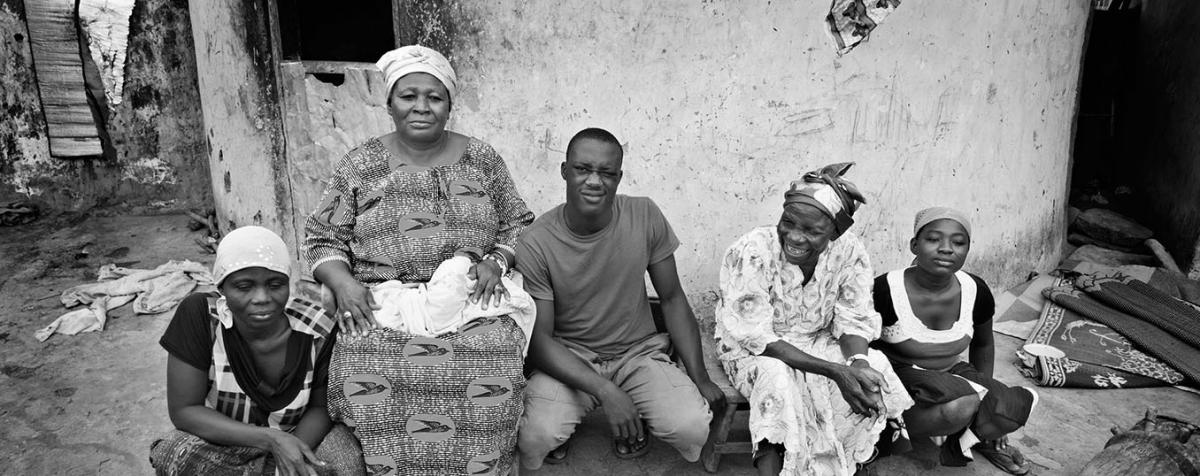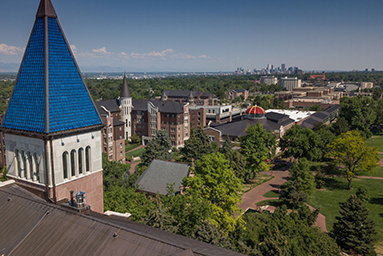MAIDP Internship Presentations
Click on a listening station below to learn more about the students and their internships.
Internship Bios
-
Listening Station 1: iAmClinic & TDRC
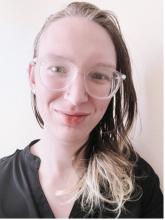
Name: Skye Kinsley
Placements: iAmClinic, Queer Asterisk, TDRC
Description: iAmClinic
iAmClinic is a counseling practice that offers individual, couples, and family counseling to the LGBTQIA+ community in Denver. The clinic’s mission is to help clients embrace their whole identity by integrating all aspects of the self with evidence-based resources to fully love oneself and others.
Reflection: During my internship at iAmClinic, I helped create content for social media, including writing blog posts, selecting soundbytes to feature from the podcast, and generating ideas and scripts for videos.
One of the biggest takeaways from my experience was having the opportunity to form more connections with clinicians working with the LGBTQIA+ community. I really appreciated the chance to hear different perspectives on the field and areas of need for clients and also really valued seeing the passion for the work that the clinicians at iAmClinic hold.
Description: Queer Asterisk
Queer Asterisk is an organization that provides counseling services, educational trainings, and community programs to the LGBTQIA+ community in Colorado. Their mission is to empower and nurture the diverse ways of being that Queer people embody by providing services that uplift Queer, trans, and gender expansive lives.
Reflection: During my internship at Queer Asterisk, I took on a caseload of ten clients to see on a weekly basis for individual therapy. I also attended weekly supervision, intern meetings, and team meetings.
Through my time at Queer Asterisk, I have gained a lot of knowledge about how to work with a diverse caseload of clients, and learned more about myself as a therapist and what my style and approach to counseling is. I have also learned that I absolutely love working with the LGBTQIA+ community.
Description: Trauma Disaster & Recovery Clinic (TDRC)
The TDRC provides psychological support to individuals and communities who have experienced stress, adversity and/or trauma. The TDRC utilizes an integrative, need and strengths-based approach that is culturally informed.
Reflection: Although I did not have many clients with the TDRC this summer, I still gained a lot out of weekly supervision and picked up on things I could try with future clients. I really appreciated the opportunity to learn from my peers and gained a lot from watching their sessions and seeing what techniques they used.

Name: Shamvi Naga Prathap
Placements: iAmClinic, Harvest Therapeutic Services,TDRC
Description: iAmClinic
iAmClinic offers counseling for LGBTQIA+ individuals and couples, as well as their religious loved ones. Their primary goal is to help the LGBTQIA+ community and their families establish internal solidarity, rooted identities, and long-term relational health. My tasks included creating the company’s LinkedIn page, writing blog posts for the website, supporting Neurofeedback-related tasks and designing my special project that reflected my interests with the population of interest. Other creative tasks were also encouraged and discussed.
Reflection: This placement was an excellent site for my global mental health internship. As a cisgender heterosexual female and an ally, my knowledge about the LGBTQIA+ was informal and limited. Therefore, this site provided experiential insights into the needs of the LGBTQIA+ population, and the nuances of working with the community while also being a part of it. The culture of iAmClinic was warm, inviting, collaborative and supportive, which made me feel heard and valued as an intern.
Description: Harvest Therapeutic Services
Harvest Therapeutic Services is dedicated to helping all individuals, couples, children and families heal. They offer an array of therapeutic services and techniques in order to best meet each individuals’ needs. They emphasize on making mental health services available for everyone in the community regardless of race, gender, sexual orientation, ethnicity, or religious preferences.
Reflection: In addition to providing individual psychotherapy services, I am grateful to have had a new opportunity to support the agency’s new Intensive Outpatient (IOP) services. Not only did I run groups, but I also supported the backend of the program in developing processes, schedules, assessment forms, etc. Although I have been a junior clinician for nearly a year at this site, I am thrilled to be unravelling another professional persona within the space of group therapy for substance use disorders.
Description: Trauma Disaster & Recovery Clinic (TDRC)
The TDRC provides psychological support to individuals and communities who have experienced stress, adversity and/or trauma. They utilize an integrative, need and strengths-based approach that is culturally informed. Their services are continually evaluated to ensure effectiveness.
Reflection: I am glad that I had the opportunity to work with three clients this summer. Each client has had different presenting concerns, which pushed my self-imposed limits as a novice clinician. In particular, I worked with a Dari-speaking client and an interpreter, which strengthened and broadened my clinical skills. Furthermore, group supervision offered incredible insights that contributed to my professional growth.
-
Listening Station 2: NCTSN & TDRC
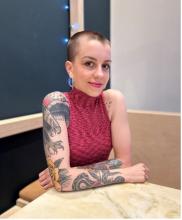
Name: Melinda "Lin" Kirstein
Placement: National Child Traumatic Stress Network (NCTSN) – Terrorism and Disaster Program, CuraWest, Trauma and Disaster Recovery Clinic (TDRC)
Description: As one of the students who stayed domestically for the summer, I completed my virtual global mental health internship with NCTSN – a national organization whose mission is “to raise the standard of care and improve access to services for traumatized children, their families and communities throughout the United States”. The Terrorism and Disaster Program focuses primarily on disaster preparedness geared towards children, parents, and other caregivers.
My domestic placement was a continuation of my first-year internship at CuraWest, an inpatient detox and recovery clinic at a hospital in Denver. As part of this experience, I conducted individual and group therapy, intakes, discharges, and other clinical procedures. Additional hours were spent supporting two clients at the TDRC, as well as participating in weekly supervision meetings with the other domestic students.
Reflection: My primary project with NCTSN was to develop a variety of social media posts about how parents and caregivers can support their children’s mental health during and after a disaster. I also compiled a list of existing resources of how various communities and organizations handle the anniversaries of mass violence events and spent a lot of time collaborating with my supervisor and other network members. Not having a professional background in social media, this internship challenged me in ways I didn’t expect. Despite being conducted virtually, it allowed me to push myself outside of my comfort zone and to showcase my past experiences as a first responder and current experiences as a parent.
In contrast to NCTSN, CuraWest was primarily a clinical placement, with some aspects of case management depending on staffing needs. With a supervisor on site, I was able to engage in individual therapy, lead group sessions, and participate in clinical procedures such as intakes and discharges. Addiction counseling has unique challenges and often looks different than other types of individual therapy. Having had the privilege to work with clients suffering from a variety of substance use disorders and complex mental health histories has helped me grow tremendously as an emerging clinician. A lot of what I learned at CuraWest has expanded my knowledge and expertise outside of addiction counseling as well, allowing me to be a more intentional student clinician with the two clients I supported at the TDRC throughout the summer.
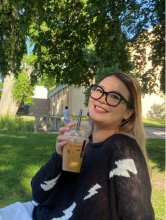
Name: Nicole He
Placement: National Child Traumatic Stress Network (NCTSN), The Village Institute, TDRC
Description: The National Child Traumatic Stress Network (NCTSN)
The NCTSN is a collaborative organization in the US, supported by the U.S. Department of Health and Human Services, aimed at helping children and adolescents who have experienced trauma and natural disasters. They provide training and educational materials to mental health professionals, educators, caregivers, and communities to offer compassionate treatment to trauma survivors. The NCTSN's initiatives have significantly influenced trauma-informed practices and improved the well-being of children nationwide.
During a summer internship, I worked directly with the Terrorism and Disaster Programs of the NCTSN. They collected input from young individuals to create effective disaster behavioral health messages, including social media distribution. The program's goals include developing resources for parents during disaster anniversaries, creating pre-planned disaster messages, and conducting a social media campaign based on findings from the Youth Risk Behavior Surveillance Survey. The internship involved exploring existing approaches, developing content, scripts, and selecting images for these projects.
Reflection: Through my internship with NCTSN, I have reviewed many useful resources regarding disaster preparedness and recovery for children, caregivers, and professionals. Actively contributing to the creation of engaging social media content allowed me to tap into my creativity and explore innovative approaches to marketing. Through this experience, I developed a greater sense of self-assurance and learned to work collaboratively in a professional setting. Additionally, I deepened my understanding of brand identity and its crucial role in shaping marketing strategies in the mental health field. The exposure to real-world marketing challenges contributed to my growth as an independent mental health professional and prepared me for future successful entrepreneurship in the field.
Description: The Village Institute
The Village Institute, located in Northwest Aurora, Colorado, is a holistic family support center dedicated to assisting refugee and immigrant families. Their goal is to empower these families by fostering wealth, worth, and well-being through a range of comprehensive services. At The Village Institute, they offer a variety of programs all conveniently housed under one roof. Family advocacy, resource navigation, career readiness training, early childhood education, and mental health services are just a few of the ways they support these families. Their mission revolves around uplifting the power and potential of refugee and immigrant families, helping them thrive in their new community. Through their integrated approach, they strive to make a positive and lasting impact, promoting holistic well-being, and enhancing the overall quality of life for these families.
I mainly work with the PAMOJA program, which is an education program that provides training for immigrant/refugee women to become certified to work as early childhood professionals. My task involves observing and troubleshooting PAMOJA village classes to identify any pressing issues that may hinder participants from effectively engaging with the learning materials. The goal is to make suggestions that will enhance the efficiency and conduciveness of the classes to create a better learning environment.
Reflection: On a personal level, it fosters cultural knowledge, empathy, and resilience as I interact with other people and learn about their distinct paths. Patience and adaptability are developed, allowing for good interactions with people from various educational backgrounds. Professionally, I build cross-cultural competency ensuring that each student receives individualized care. Engaging with the community promotes networking and community collaboration, enhancing the program's overall effect.
Description: The Trauma & Disaster Recovery Clinic (TDRC)
The TDRC is a student training clinic that provides psychological support to individuals and communities who have experienced stress, adversity and/or trauma. We utilize an integrative, need and strengths-based approach that is culturally informed. Our services are continually evaluated to ensure effectiveness.
I conduct individual therapy sessions with clients under the supervision of licensed professionals, which involves developing treatment plans, implementing evidence-based therapeutic techniques, and assessing progress.
Reflection: Through working with my client, I enhanced active listening, empathy, and resilience in therapeutic interactions, deepening understanding of human emotions. As for professional development, I have improved and deepened my understanding in therapeutic techniques and ethical considerations for compassionate counseling practice.
-
Listening Station 3: CVT & TDRC

Name: Veehangi Singh
Placement: Center for Victims of Torture (CVT), Trauma and Disaster Recovery Clinic (TDRC)
Description: Center for Victims of Torture (CVT)
CVT is an international nonprofit dedicated to healing survivors of torture and violent conflict. Helping Survivors Heal ( HSH ) is designed to expand access to quality, evidence informed services for survivors of torture and those impacted by conflict that are adapted to local contexts. HSH will approach this goal through intensive capacity development support to enhance the effectiveness of organizations. HSH has 12 partner organizations throughout the world in various countries: Mexico, Colombia, Kosovo, Tunisia, Lebanon, Turkey/Syria, Zimbabwe, Nepal, Bangladesh/Myanmar, Malaysia (refugee context), and the Philippians.
Reflection: My internship experience with CVT has provided me with an opportunity to challenge , learn and grow as an aspiring clinician, but more importantly as a global mental health and humanitarian aid worker. I was involved in conducting a literature review on evidence-based interventions for treatment of complex trauma presentations in torture and war victims. One of my goals coming into the IDP program was addressing the gap in the dissemination of culturally informed evidence-informed interventions for marginalized groups and communities. The internship opportunity with CVT and particularly working as a part of HSH project was a milestone in this journey for me, as it allowed me to understand the existing literature on culturally informed interventions and the many nuances involved in working with culturally diverse groups. The opportunity of working alongside supervisors who have countless years of experience working with torture victims in conflict-zone areas of the world broadened my perspective on the important considerations in serving such sensitive groups.
Description: Trauma and Disaster Recovery Clinic (TDRC)
The TDRC is a specialty clinic within the Professional Psychology Clinic at the University of Denver, which provides psychological support to individuals and communities who have experienced stress, adversity and/or trauma.
Reflection: During the summer, I saw clients via the TDRC. It is always such a huge learning experience working as a clinician as a training clinic. Having supervision for these sessions allowed me to provide trauma-informed care to very different and unique presentations of complex trauma and adapt my skills to meet the needs of each of these clients.
-
Listening Station 4: Grenada
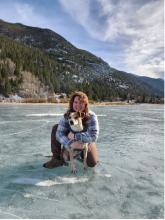
Name: Bayley Chenault
Placement: Reach Within in St. George’s, GrenadaDescription: Reach Within is a non-government organization (NGO) that strives to break the cycle of intergenerational trauma and promote resilience and self-regulation in unhoused, trauma-affected children, youth, and young adults. The NGO serves trauma-affected, unhoused youth in the Child Protection Authority system in five residential care homes by providing rhythmic activities, mindfulness practices, and healthy attachment practices to help them develop emotional regulation skills and build healthy social connections. Additionally, Reach Within also supports young adults who are transitioning out of the care home environment through a Transitional Living Program.
My role with the organization has been focused primarily at SMILES, which is a home that houses girls ages 12 to 17. I created a custom Therapeutic Photography project for these girls, where they learned about photo theory, storytelling, and how to express themselves through a creative outlet. Additionally, I provided support in the other four homes with established Reach Within programming. I also provided animal therapy with Rosalyne, my service dog. Rosalyne is a trained psychiatric service dog specializing in trauma; she assists with teaching the residents listening skills, self-soothing techniques, boundaries, and how to be a gentle caregiver.
Reflection: My experience with Reach Within has been a roller coaster in the months leading up to the internship, which took an unexpected turn. My personal connection to photography helped me navigate a way to contribute to the internship, and I had the privilege of teaching girls how to utilize it the same way I did at their age. My communications background contributed to my ability to create the program with a curriculum and presentations. I truly enjoyed teaching each week. My experience from my previous placement gave me the skills needed to co-facilitate the groups each week. Personally, this experience has been healing for me and also validated the type of work I want to be a part of. I went into this experience open-mindedly; although initially, I did not want to work with youth, I now have gained the desire to do so, along with valuable tools that I will utilize in my work.
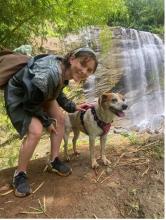
Name: Kaleigh Howard
Placement: Reach Within, GrenadaDescription: Reach Within works with youth and differently-abled individuals who were removed from their living situations by the Child Protection Agency (CPA) and are housed in carehomes on the island. Reach Within aims to foster lasting skills based on rhythmicity to help the residents of the homes cope with past trauma and with the future. Many of these rhythmicity sessions include activities like dance, drumming, swimming, and music. They also provide other opportunities like gardening at the homes, working withthe residents when they age out of the homes (Transitional Living Program; TLP), and even visiting residents placed in prison. They also aim to educate and support the caregivers who work in and run the homes to foster connections and trauma-informed caregiving. While there, we were able to join in all the rhythmicity sessions, help to co-facilitate an outing with the TLP program at a Waterfall, and run our own specialized group based on our interests, mine being a gratitude group. We also got to work on manuals to help out the caregivers and Reach Within for future projects, conduct a small impact study, and do some one-on-one mentorship with some of the children.
Reflection: I loved my experience in Grenada, especially working with the Reach Within Team. I also learned a lot about some of the future work I would like to do. I found the somatic aspect of Reach Within's approach to be compelling, as well as the emphasis on supporting caregivers. Supporting caregivers has been a passion of mine for some time, so it was nice to see the importance of this reiterated during my time on the island. Further, I thought I never wanted to work with kids, but I developed a love for engaging with children in a therapeutic context and want to explore this more in my future work. On a personal level, seeing how passionate and dedicated the Reach Within Team is also gives me some inspiration about continuing along this career path. I felt burnt out before this internship, but I am leaving ready to continue with a more concrete idea of some areas I enjoy working in.
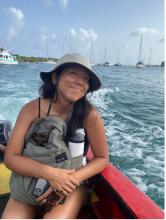
Name: Tenzin Tseten
Placement: Reach Within in GrenadaDescription: Reach Within serves children, adolescents, and young adults who have experienced trauma, neglect, and various forms of abuse in their household who now reside in one of the five care homes that are established on the island. Their mission is to transform childhood trauma into healthy outcomes through their rhythmicity program, caregiver training program, and the transitional living program for aged out youth in the residential care system.
During my 8 weeks in Grenada, I assisted with drumming, dance/movement, swimming, and yoga sessions in the care homes. By using rhythm based activities, children are able to achieve a more regulated nervous system where healthy connection is possible. I was given the opportunity to build a curriculum surrounding mindfulness practices with teenage girls in one care home where we engaged in guided meditations, journaling, yoga/movement, mindful eating, muscle relaxation exercises, as well as ukulele lessons!
Reflection: It was powerful to witness the strength of human connection and how many of these residents craved quality relationships with those around them. I learned more about the complexity of these care homes being a workplace for the caregivers as well as a home for the residents; it opened my eyes to the many challenges that both the caregivers and the children face in their day-to-day lives. This experience offered more depth on the experience of trauma in children and how it can manifest into behavioral issues which cascades into a certain culture that persists within the care homes. I was also able to examine the system-level barriers that exist in Grenada and how certain policies create a trickle-down effect into the care homes that deeply affect the caregivers and residents. This summer reminded me that at the root of all high quality work is hope, connection, and curiosity.
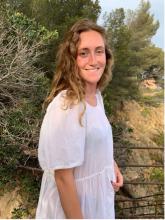
Name: Siena Van Sickle
Placement: Reach Within, St. George, GrenadaDescription: Reach Within aims to support children and young adults on the island who have been removed from their families of origin by the Child Protection Authority and placed into residential care homes for reasons not limited to domestic violence, abuse, and neglect. From the moment children and placed into a home through when they transition out of the homes at 18 years old, Reach Within staff members act as mentors and role models to these youth. Through the utilization of rhythm-based activities such as drumming, dancing, swimming, and yoga, as well as through modeling healthy attachment and conscious discipline, Reach Within hopes to transform the care home environment into one that is conducive to healing from trauma. My role as an intern at Reach Within was to create a 6-week curriculum for a therapeutic activity of my choice. I selected Dance/Movement Therapy (DMT) due to its reported success across cultures, age groups, and education levels. With sufficient structure and support, I believe DMT can be a powerful tool for teaching a variety of prosocial and developments skills as well as giving children an opportunity to connect with their peers, practice independence, and build resilience.
Reflection: Utilizing rhythm- and movement-based therapies with children in a group setting has been quite different than anything I have learned about in a classroom or witnessed at a domestic field placement. This summer internship has pushed me to expand my conceptualization of what therapy is and what it can look like. As a master’s students in the United States, it is easy to become attached to the idea that talk therapy is the only relevant and effective form of therapy. Working alongside the brilliant staff members at Reach Within has allowed me to broaden my horizons and add to my growing repertoire of mental health care interventions and practices. In future work, I aim to take what I have learned here and approach therapy and treating clients more holistically, taking every cultural and social factor into account. I am incredibly grateful for the people here in Grenada, for being our teachers, mentors, and friends throughout this summer and look forward to returning to this beautiful island for a visit in the future.
-
Listening Station 5: Chaska, Peru
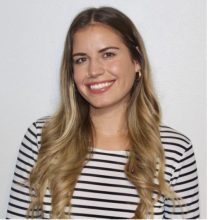
Name: Kimber Carter
Placement: Chaska, Peru
Description: Chaska’s name originates from Peru’s native language, Quechua, and means “Star”. Chaska is a non-profit organization serving young girls who come from very low socioeconomic status single-parent households. Chaska’s main goal is to break the cycle of poverty by identifying “stars” within the community that otherwise would not have a chance to escape an impoverished lifestyle. Chaska seeks to provide support to its beneficiaries in three ways: educational, emotional, and financial. Additionally, Chaska provides a daily nutritious meal (often Belgium and Peruvian cuisine inspired) as well as a safe space for each of its beneficiaries. My main responsibilities were overall program support including updating their respective google drive to reflect current practices and archiving old information, statistically testing assessments used for the selection and the monitoring and evaluation processes, participating in home visits, and proposing new ideas to better support the girls of Chaska based off of information gained from conversations with them.
Reflection: Throughout my time at Chaska, I’ve learned numerous skills that have contributed to my overall personal and professional development. Personally, I’ve advanced in my Spanish fluency by conversing with Chaska beneficiaries and taking Spanish classes simultaneously. Additionally, I’ve learned to adapt to a different pace of life then what I have been used to in the U.S. To be specific, Peru is a polychronic society meaning that community members are not ruled by time and instead adjust time to meet their needs. Interning at Chaska has been more about the quality of work rather than simply completing the required number of hours. Finally, I’ve recognized the power of remaining curious, asking questions, and actively listening while reflecting on the beliefs I hold. Over time, I’ve realized that Peruvian culture is quite different from life in the U.S. and with that realization I’ve learned that it is critical to not make assumptions based off of my own experience when working with individuals internationally. Professionally, I’ve gained valuable skills in working with community members in a global context such as navigating a language barrier and learning about Peruvian culture. Furthermore, I have advanced my research skills by providing resources based off of Chaska’s needs and statistically testing evaluations that are currently in use. Also, I have been able to apply what I learned in our program evaluation class to my work here at Chaska. For example, I proposed an annual needs assessment process that involved creating an anonymous survey in order to understand how Chaska’s beneficiaries feel about the current services being offered and ways in which Chaska can improve. Overall, I feel grateful for this experience given that I can use the skills gained during this internship to better serve individuals from varying socioeconomic and racial backgrounds.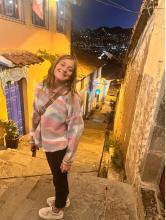
Name: Mia McLaughlin
Placement: Chaska, Peru
Description: Chaska, a non-profit organization operating in Cusco, Peru, is a scholarship program for girls in their secondary education (equivalent to US high school). Participants are expected to come to Chaska every day after school where they are served lunch and offered resources such as study spaces, computers, internet, a kitchen, and more. Chaska helps families financially with extra school programs and University. Chaska aims to help guide and support students into their professional/career development by exploring a wide variety of passions and career possibilities. Additionally, the program offers peer support and academic as well as emotional mentorship. Chaska was just beginning a selection process for a new cohort of girls when we arrived, so we have been assisting with the process by scoring personality and intelligence tests and doing home visits/family interviews with prospective girls. Chaska was piloting a selection test this year so I had the opportunity to collect and analyze data, and make suggestions based on my findings for this test. We have also been conducting annual evaluation assessments, suggested and set up by previous IDP interns, and following up with the appropriate documentation.
Reflection: This experience has been very productive for my professional development. While we have not done any client-facing or clinical work, I have learned a lot from taking initiative over the program evaluation/annual assessment process, and the updates we have made to the selection process, particularly the selection tests. We have also been thinking critically and as trauma-informed as possible regarding the home visits throughout the selection process, trying our best to figure out how to help those that need it most. I am learning more about non-profits in a global context every day and constantly thinking about how to be effective and compassionate in all the work I do.
-
Listening Station 6: South Africa
Name: KP Hartman
Placement: Centre for the Study of Violence and Reconciliation (CSVR)
Description: “CSVR provides mental health and psychosocial support (MHPSS) and other interventions to address and prevent violence and human rights violations. CSVR's work is rooted in an analysis of the shifting forms of conflict and violence within societies enduring a transition to democracy.”
Forensic Academy Case Study – my cohort and I focused our energy on evaluating the Forensic Academy which is an multi-year, multi-phase professional education program designed to support professionals and organizations who work with individuals and communities affected by enforced disappearances. Our aim was to understand the outcomes of the program, identify possible best practices for this kind of work, and the overall program efficacy. While the Forensic Academy is an ongoing process, understanding its impact so far will be key to its evolution.
Reflection: There’s a lot to be said for learning how to navigate the intricacies of INGOS and how they function. My work with the Forensic Academy is exciting – not only for what I’m learning about the process and the parallels I’ve seen regarding my academic work in Denver – but because there’s big picture implications for how we engage in post-oppressive regime support and provide care to communities who have experienced extreme traumas at the hands of their governments. Additionally, much of what we’re leaning is getting applied in countries currently navigating new or returning oppressive regimes and we’re learning about what this work means there in real time too.
Moving into my second year, I’m looking forward to seeing how what we’ve achieved here can support our work in the TDRC and the Survivors of Torture Program as well. I’m also learning that I love qualitative research AND I’m happy in the clinical setting where I can work actively with people in their healing process. I’m looking forward to a future where I can do both.
Name: Meaghan Horsley
Placements: Centre for the Study of Violence and Reconciliation (CSVR)
Description: CSVR is a non-profit based in South Africa that focuses on research, community interventions, mental health, education, and training for people impacted by violence and collective trauma. My role was on the MHPSS monitoring and evaluation team conducting a research study to evaluate a project to glean lessons learned and inform future phases. This involved conducting interviews, focus groups, and surveys to collect data from project participants and facilitators and writing a report with the data.Reflection: My time at CSVR was rocky to start but ultimately valuable and meaningful. The biggest challenge was feeling connected to and part of the organization when all of my work was virtual, something I wasn’t aware would be the case until after I arrived. I found I focused more on the work I was doing than the organization I was doing it for. Connecting to South Africa was even more difficult. Joburg is a dangerous city, and every local I spoke to said to take extreme precautions when going out. I quickly found I had few reasons to leave my Airbnb: my work was done from home, going anywhere was dangerous, and I had no social connections through CSVR to get me out of the house. With no reason to stay in Joburg to do my work, I ultimately left South Africa to work remotely from Portugal. Making the choice to leave and asking for help around that was incredibly difficult and was a significant moment of growth for me.
My initial frustrations with CSVR for not being clear that I would be working remotely and not having purposeful work mostly faded once I got somewhere safe and was able to start the research project. Gaining research experience was one of my main goals for my internship, and diving into that was new and intimidating for me. Much of the process was ‘learn as you go.’ I enjoyed focusing on each step in detail. The thematic analysis was where I learned the most. Qualitative data is a unique challenge, so analyzing with a more narrative lens was required. It involved reading through all of the project documents and the transcripts from the interviews and focus groups, and highlighting portions that captured specific themes. Things like justice, hope, and human connection were at the forefront of participants’ experiences in many different ways. Pulling the themes together into the final research report was the hallmark of my internship. By the time we got started on the project, we had only five weeks to do everything, and the sudden pace pushed me to adapt and think on my feet. I was grateful for the opportunity to expand my skillset and learn things I’d never done before, and I felt greater purpose when I was doing meaningful work. -
Listening Station 7: Uganda

Name: Caroline Kampschroeder
Placement: Makerere University, StrongMinds Innovations Lab
Descriptions: At Makerere University, I interned with the College of Humanities and Social Sciences (CHUSS) department where I worked alongside other graduate students pursuing a masters in community psychology. I was tasked to work in collaboration with my colleagues to create the foundation and framework of a curriculum for humanitarian workers.
StrongMinds is an organization that works to end the epidemic of depression in low-income women and adolescents, but it is now becoming a global mission. I worked specifically in the global office’s Innovations Lab in Uganda. It is an exciting time to be a part of StrongMinds as they are developing their own therapeutic model called StrongMinds 10.0 after providing interpersonal group therapy (IPT-G) for the past 10 years. In addition, they are working to implement single session interventions as a way to reach more people and have a bigger ripple effect. To aid in the development of these interventions, I was tasked with completing extensive literature reviews on single session interventions and common elements of depression interventions. I travelled to different cities around the country and worked with the different field offices StrongMinds has in Uganda. It was my responsibility to conduct focus groups with current group therapy clients, past clients, therapists/coaches, supervisors, and district project officers. These focus groups allowed me to interview them for their voice to play a part in in the creation of StrongMinds 10.0 and the single session intervention. This allowed me to facilitate discussions around what is working, is not working, and any recommendations on what could be changed. These focus groups ranged from office setting, community settings and then in primary schools.
Reflection: As I reflect on my time in Uganda, I am not sure I will ever be able to comprehend its impact it had on me. It challenged me both personally and professionally. Personally, I grew a lot by advocating for myself in not just a professional setting, but also a completely different culture. I learned about the mere flexibility that is required and that you may not be able to have control over what you expect to. Professionally, I was in the field for days at a time engaging with community members. This challenged me to continue to swerve and change my working environment. I often had to use an interpreter and I was exposed to the livelihood of the individuals who were currently in treatment or had previously received it. It was incredibly impactful to hear the clients’ stories and see how beneficial the treatment was for them. It made me remember that humans are incredibly resilient and no matter the darkness, there is always a light, but sometimes we cannot always find that light on our own. If I could go back to ranking countries all over again as a IDP 1st year, Uganda would still be my #1.
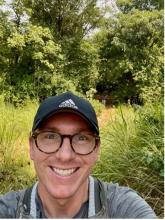
Name: Brendan Sharp
Placement: Kampala, Uganda. StrongMinds and the College of Humanities and Social Sciences (CHUSS) department at Makerere UniversityDescriptions: I interned with StrongMinds, a non-governmental organization with a goal of ending the depression epidemic in Africa. There is a concerted effort on providing cost-effective and easy to use interventions for communities across Uganda. There is emphasis on reaching rural areas and providing interventions which are easily taught and carried out by lay-volunteers to their community with an overall goal of reaching more people with quality and effective mental health interventions. I also interned at the College of Humanities and Social Sciences (CHUSS) department at Makerere University where I worked in collaboration with graduate students pursuing a masters in community psychology. During the time interning with this department, I helped develop the foundation and framework for a humanitarian aid curriculum.
Reflections: I assisted StrongMinds in various capacities, conducting focus groups with staff and clients located in various towns across Uganda (e.g., Gulu, Wakiso, Mukono, and Mbarara) with the goal of evaluating current interventions in practice. I also worked on literature reviews looking at the efficacy of single-session interventions and common elements of depression with the hope that this work will aid in the development of new easy to use and effective interventions. One of the most impactful takeaways for me personally, is that I was intentional about nurturing necessary skills, such as slowing down, observing, and active listening while in Uganda which fostered growth in key competency domains essential for providing effective psychotherapy once I return home. Additionally, working with graduate students from Uganda was an enriching experience where culture, context, and life experiences took center stage in bringing unique ideas and content to the framework that was developed. This highlights and drives home the importance of collaborating with local stakeholders in the development of any material which will be used in the country which it was developed for.
-
Listening Station 8: Kenya
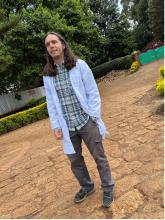
Name: Wes Lopez
Placement: Methodist Treatment and Rehabilitation Center, Meru, Kenya
Description: This internship was at a homestay location, and I had the opportunity to stay with Rev. Dr. Catherine and her family. The population served during this time were adults who struggled with substance abuse and were either voluntarily or involuntarily admitted into the treatment center. The center utilizes a ninety-day inpatient program that involves psychoeducation classes, twelve-step classes, life skills classes, individual and group counseling services, medical services, and weekly church services.
My duties were to facilitate counseling services and teaching classes; primarily individual and group sessions along with psychoeducation and twelve-step classes. I worked collaboratively with the other counselors within the center to ensure quality services were given to each client. I also had the opportunity to write a funding proposal for the center so that the center could become National Health Insurance Fund (NHIF) accredited. The NHIF is the largest insurance provider in Kenya. Writing the proposal included collaboration with Dr. Catherine, IDP faculty, and the center staff.Reflection: Having personal experience with the substance abuse community is one thing, but being able to render clinical services to this population while in a different cultural context was crucial for my professional development and I feel blessed to have had this opportunity to do it. The funding proposal was additional work that was tacked onto my schedule when I arrived in Kenya. I did feel a lot of pressure in ensuring that it’s a good document, so the amount of time that I put into research, writing, editing, and receiving guidance took up a large quantity of my time that could have been used for other assignments or just to fully experience my internship in Meru. I did feel some disappointment in that, but selfishly, regarding my professional development and how good this would look on my CV, I took everything in stride. Because looking at the pros and cons of time lost to this document compared to the benefits of writing this document, the pros outweighed the cons. Because of this document I have made lifelong connections with Dr. Catherine, her family, the center staff, and the Center for Health and Hope in Denver. I have finished something that is pivotal for my professional development, and I will be the maintenance implementation factor of ensuring that the document is completed; which means hopefully coming back to Kenya every so often. It was a give and take, but for longevity purposes I didn’t mind giving more during the current moment so I can harvest the seeds that I’ve laid in the future.
-
Listening Station 9: Northern Ireland

Name: Felicity Bell
Placement: Belfast Trust with the Trauma and Support Service Team (TSS)
Description: The Belfast Trust works directly with the National Health Service (NHS) and the mission statement for the Belfast Trust includes the following, “It is about treating everyone as we would like to be treated”. During my time with the Belfast Trust, I was assigned a project that allowed me to build a workshop for residential care staff who works directly with children and early to late adolescents who have a diagnosis of ASD or an assumed diagnosis of ASD and have had exposures to trauma(s). My workshop is titled the following, “Autistic Spectrum Disorder (ASD) & Trauma Workshop – An Integration of a Practical Application Approach in Residential Spaces”. The development of my workshop is meant to be implemented over a week’s period of time and includes four different phases that address the following: Phase (1) – What is ASD; Phase (2) -What is Trauma? & Differential Diagnoses; Phase (3) -Presentations of Behaviors; and Phase (4) How to Help Residential Care Staff & Conclusions (next steps for future interns). As an intern, I created a facilitators guide, a follow-along guide for residential care staff, two worksheets/handouts that include two activities, provided a sample of the Coventry Grid, as well as a brochure for new residential staff that provides “quick tips” for engaging with adolescents and children diagnosed with ASD.
Reflection: My time with the Belfast Trust provided me with opportunities to get involved with the Trauma and Support Service Team (TSS), which built a podium for me to speak, give international insight, receive international perspective, as well as observe and learn from my colleagues around me. Not only was I able to be involved in an internship in a different cultural context and county, and create a workshop for the Trust, but I was able to interact with staff who are locals of Belfast society and attend to first-hand narratives that discussed the religious and political history that surrounds Belfast culture. Connecting with the community, even in the limited amount of time I had, was crucial and imperative for this immersion experience.
Having the option to live in a different cultural context other than the one I have known for twenty-three years of my life was rewarding, and with that came an immense amount of personal and professional growth as well as a magnitude of life experiences. I cannot say that I can give myself the role as a Global Mental Health Expert, as that role and title comes with many years of experience and exposure. However, it is a duty of mine to continue immersing myself in novel cultural contexts, like Belfast, Northern Ireland, to hold the role as a learner and to use this learning as I grow as a future mental healthcare clinician and work directly with globally diverse individuals.
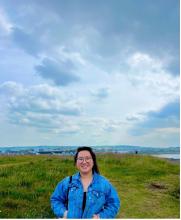
Name: Tina Phan
Placements: The Belfast Health and Social Care Trust in Belfast, Northern Ireland with the Therapeutic Support Service branch
Description:
My global internship this summer was at the Belfast Health and Social Care Trust’s Therapeutic Support Services in Northern Ireland. This branch is a part of a bigger health system in the Northern Ireland region. The Therapeutic Support Services specializes in case consultations and psychological therapy working with adolescences and families all around the greater Belfast area. Their goal is to provide the highest quality of psychoeducation and other psychological needs to those who need it. They work with a wide range of professionals or individuals involved in the client inner and outer systems in order to achieve this. These include parents, social workers, teachers, foster caregivers, medical professionals, and other professionals in the adolescences or client’s life. Their approach to their therapeutic work is to look at the client’s entire network, which typically incases all the professional listed above, and see the effects these systems might have. The team is comprised mostly of individuals who have grown up in the Northern Ireland area their entire life. This secures a deep understanding of historical and cultural nuances that are unique to this area. In addition to this, they work heavily with a trauma-informed care lens to ensure the best for their clients.
During our time at this internship, we took part in:
Case Consultation: I sat in on case conceptualizations where referrals from social workers, educators, foster parents, and other professionals that work closely with children seek out the team’s expertise and insights on how to address concerns regarding the child. This ranges from psychoeducation to tackling cases through a systematic lens.
Creation and Implementation of Training Guides to staff and others: I created training guides, graphics, pamphlets, and researched resources to aid in addressing refugees and asylum seekers through a culturally sensitive and trauma-informed care lens. I presented this material to the TSS staff and those directly working with this population.
Attended Workshops: I attended workshops that provided relevant insights into the social issues of Northern Ireland and narrative training. This was to provide me a small window into the current issues and how the systems were setup in this region. Along with this, I had chances to network and connect with current social workers and psychologist.
Reflection: This immersive global field placement has brought with it personal and professional growth. I am extremely grateful for the opportunity I have been given to be able to work in a mental-health field setting in a different culture. From learning new cultural nuances and a different work culture, I have felt challenged in the best way. Being able to bring what I have learned in the past year from my MAIDP classes, has brought upon me a newfound confidence in my skillsets. While learning in classes from expert professors has been great, implementing the ideas has been extremely rewarding. It felt like a glimpse into the career I set out to achieve. Through this experience I have seen the heaviness of transgenerational trauma, how trauma plays out in a world outside the United States, and the different approaches active psychologist and mental health professionals utilize in their work. There have also been important lessons learned about self-care and rest that, as students, we do not afford ourselves very often. The importance of the impact of a “restless rest” will change how I continue forward. While the two months have been short, my personal and professional growth has seen leaps greater than the time I have spent here. It saddens me to leave as I know my current project with refugees and asylum seekers will continue beyond me. I hope that I have set a steady foundation for the generous folks at the Belfast Trust in order to continue to provide the best quality of services. I know I will continue to refer back to this short summer in Belfast as I work towards my career goals.
-
Listening Station 10: Serbia
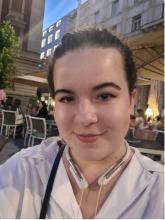
Name: Alissa Davies
Placement: Psychosocial Innovation Network (PIN) in Belgrade, Serbia
Description: PIN is a non-governmental and non-profit organization made up of passionate and driven women who strive to achieve multiple initiatives within the field of psychology. PIN’ s initiatives and services fall under three broad programs: Research, Advocacy work, and the Provision of direct mental health and psychosocial support services. PIN works with the migrant and refugee population, particularly children and youth refugees, and the local Serbian population. Throughout my time working with PIN, I assisted with data collection and input for their annual study on the mental health of refugees and asylum seekers, conducted desk research on a variety of topics including UN policies, psychoeducation activities for children and youth refugees, and current news and developments surrounding countries whose citizens comprise large portions of the global refugee population.
Reflection: Working with the team at PIN has been very motivational and illuminating for me when it comes to mapping out my future career path. My time here has shown me that I absolutely want to work with psychological organizations through global partnerships and I want to be involved with a variety of initiatives and projects that span a range of populations and topics. This might require looking into positions with the United Nations or seeking out organizations like PIN that have established multinational partnerships to explore topics and provide direct psychological services to people in need.
-
Listening Station 11: Nepal
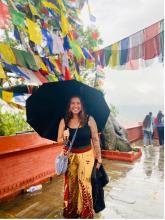
Name: Sabrina Herstedt
Placement: Voice Of Children (VOC), Nepal
Description: Voice of Children is an NGO with two locations in Nepal that works with the community to locate at risk youth: youth experiencing homelessness, abuse, and/or addiction, and works to stabilize them in the pursuit of reintegration. Through their 4 step program, they help young boys aged 4-16 become stable enough to live on their own or to rejoin their families, and empowered enough to pursue further school or trade. Throughout our 8 weeks, we were tasked with helping the boys with their daily responsibilities, connecting with them, and conducting workshops for various audiences. This included a local masters psychology class, the staff of VOC, and the children we were rehabilitating. We also had the chance to counsel children and teach English classes.
Reflection: Life in Nepal is so dichotomous to that of American life. Work culture is filled with spontaneity and flexibility rather than rigid deadlines and clear parameters. The people operate on a trust system and help those around them, rather than succumbing to a “every man for themselves” mindset. In my pursuit to facilitate healing with the boys I worked with for 8 weeks, they taught me patience, kindness, to let go of control, and the meaning of community. Most importantly, they helped me fall back in love with life. Having the ability to experience life and work through such a vastly different lens has given me a unique perspective on how we define healing and success. As I return back to my schooling and career, I will take with me the invaluable lessons and use them to guide me in my practice. I am forever grateful for the people I have met and the experiences we shared. I can only hope I have enriched their lives in at least a fraction of the way they have enriched mine. My heart will forever carry a piece of Nepal.
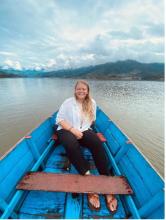
Name: Gina Severin
Placements: Placement: Voice of Children (VOC) - Kathmandu, Nepal
Description: Voice of Children (VOC) is a non-governmental organization located in the valleys of Kathmandu, Nepal. As an organization VOC strives to advocate for street children who are survivors of sexual abuse by offering opportunities to develop into their full potential. VOC has been working with children living/working in the street for over twenty years focusing to rescue, rehabilitate, and then reintegrate them back into society. VOC also works with the families living in urban poor/slum areas to empower and develop their capacity in order to prevent their children ending up on the streets. The organization uses their platforms in the local communities to raise awareness on child sexual abuse and offers legal, social, and psychological support to children and their families. After rescuing children, the center provides shelter, food, and clothing, as well as education, play, and emotional care; each service and program promotes the goal of reintegration either with their families or broader community.
Our roles as interns this summer have taken new forms each day. It has included engaging with the children, teaching, building intentional relationships, and most importantly creating workshops to provide the staff and children with tools to incorporate during their healing journey. The children workshops included learning about emotions, what emotions might look like, and learning different coping skills when faced with intense emotions. As a team we utilized Trauma-Informed Care when working with the children on a day-to-day basis. When we are not in the classroom or presenting a workshop, we are building relationships through conversations, games, and playing cricket in the rice fields next to the center.
Reflection: When arriving in Nepal I did not have any expectations for the summer. Reflecting back on my time here in Nepal, I have witnessed extraordinary growth within myself and the community at Voice of Children (VOC). All the children coming in from the streets are in a healing process where they process their trauma and pain they have endured. As an outsider coming in I have found it really meaningful to be a part of the team at VOC and witnessing the resiliency within the group of boys. I have experienced so much joy and kindness from the boys, it has shifted my perspective on what a healing process might look like. Being part of the VOC team, it is prevalent that staff members treat the boys as their own children. While I have been finding new ways to communicate due to language barrier or with our nonverbal kiddos, their guidance and energy speak volumes. All the relationships I have built while being immersed into the beautiful culture has connected me back with why I have a passion for advocacy and the mental health field. Moving forward I am eager to take my experiences and what I have learned into my future career as a therapist. -
PEERS® DENVER – Fall 2023 Excellence in Training Award Recipient
PEERS® Denver is a private clinic offering a variety of evidence-based, caregiver-assisted social skills programs which follow the PEERS® model. PEERS®, or the Program for the Education and Enrichment of Relational Skills, has been researched and developed over the course of nearly two decades at UCLA, primarily for the benefit of neurodivergent teens and young adults. In the program, separate parent and teen/young adult groups meet once a week to learn and practice social skills through various games, role plays, and other structured activities. Each teen/young adult has a parent or other close figure in their lives who learns the same social skills in a separate “parent group,” so they can function as a social coach, assisting their teen or young adult outside of the group by practicing the skills together, offering feedback, and helping them to prepare to use specific skills in their day-to-day lives. PEERS® Denver deeply values the practicum students who serve as co-facilitators to the multiple groups they run each week. Because of the valuable experience of engaging with the curricula, participating families, and clinical supervisors, students have nominated Dr. Jason Peirce and Dr. Richard Rabbitt at PEERS® Denver for the Excellence in Training Award.
